ROBERT WILLIAMS BUCHANAN (1841 - 1901)
|
ROBERT WILLIAMS BUCHANAN (1841 - 1901) |
|
|
|
|
|
|
|
|
Tulip Time (1935)
Tulip Time The musical score of Tulip Time was published by Francis, Day & Hunter Ltd. in 1938 (124 pp.) and the libretto was also published by Samuel French in 1939 (79pp). An earlier version of Tulip Time had been tried out at several venues on the south coast (including Brighton, Eastbourne and Folkestone) in August, 1933 under the title, Sweet Seventeen. |
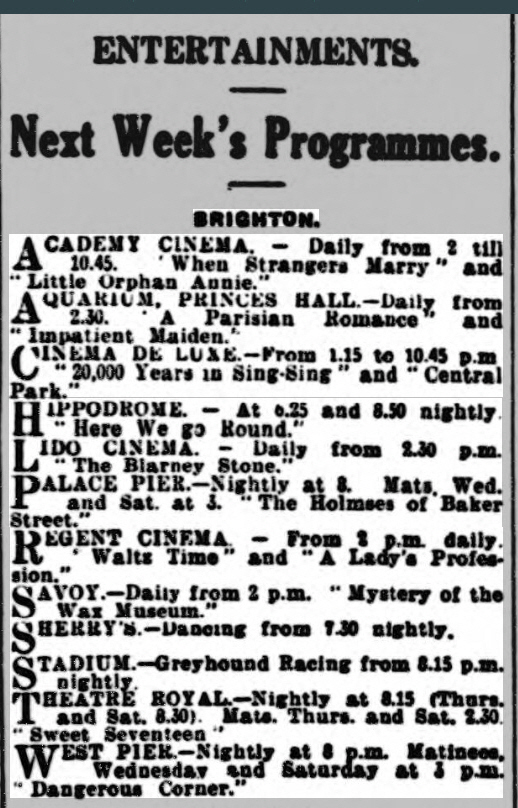 |
|||
|
[From the Sussex Express (28 July, 1933 - p.8).] |
|||
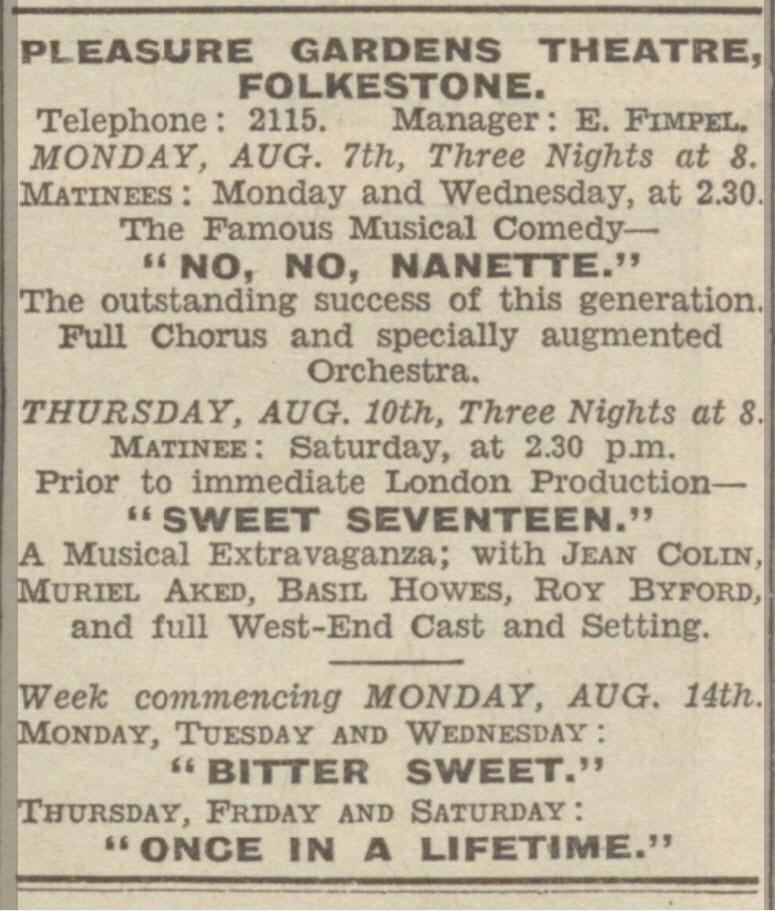 |
|
[From The Dover Express and East Kent News (4 August, 1933 - p.6).] |
|||
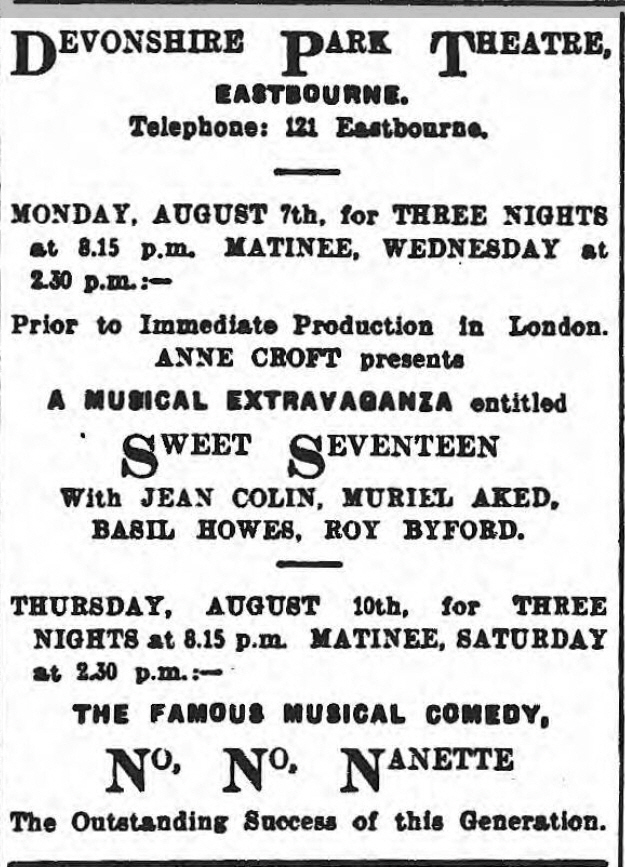 |
|||
|
[From the Hastings and St. Leonards Observer (5 August, 1933 - p.8).]
Hastings and St. Leonards Observer (5 August, 1933 - p.9) DEVONSHIRE PARK THEATRE.—The delightful musical play, “Sweet Seventeen,” will be presented at Devonshire Park Theatre, Eastbourne, on Monday, Tuesday and Wednesday, by a strong cast, including Jean Colin, Muriel Aked, Basil Howes, and Roy Byford. The attraction during the latter half of the week will be the famous musical comedy, “No, No, Nanette,” the show that sent London wild with delight. Patrons are asked to note that the evening performances at this theatre, in response to many requests, now begin at 8.15, and there are matinees on Wednesday and Saturday at the usual hour of 2.30. ___
Folkestone Herald (5 August, 1933 - p.4) |
|||
 |
|
. . . “Sweet Seventeen.” From Thursday next, Pleasure Gardens Theatre audiences will have an opportunity of seeing the prior-to-London production of a musical extravaganza presented by Miss Anne Croft, the well-known musical comedy actress. |
|||
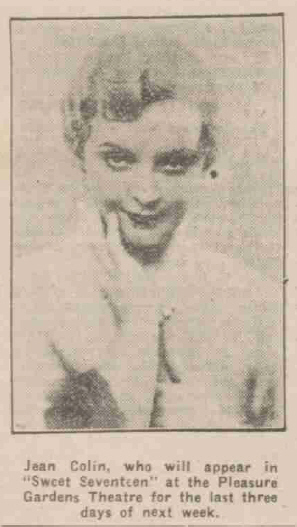 |
|||
|
(p.7) “Sweet Seventeen.” ___
Folkestone Herald (12 August, 1933 - p.11) Pleasure Gardens Theatre “Sweet Seventeen.” ___
The Sunderland Echo and Shipping Gazette (12 August, 1933 - p.7) Among the work that is going on in British studios at the moment, I notice that Muriel Aked has a gem of a character part in “Friday the 13th,” which is being completed at the Gainsborough Studios. Emlyn Williams and Belle Chrystall are also playing in it. [Note: If the 1933 version of Friday the 13th has piqued your interest the film is available on Free-Classic-Movies.com.] ___
The Hull Daily Mail (24 August, 1933 - p.7) Anne Croft OUR fellow townswoman, Anne Croft, evidently sees a future in the sage. The elder of her two sons, age 16—gracious how time passes—has been appointed her manager. She herself is playing the lead in her own company at twice-nightly performances of “The Chocolate Soldier” and in her “leisure” moments attending rehearsals of her new play which was to have been called “Sweet Seventeen” but is now named “The Girls of Vanderloo.” ___
The Yorkshire Evening Post (2 September, 1933 - p.5) Anne Croft Gets Busy. ___
The Stage (3 January, 1935 - p.9) PROVINCIAL PRODUCTION “TULIP TIME.” On December 26, 1934, at the Alexandra, Hull, Anne Croft, in conjunction with Ray Turner-Marshall, Ltd., produced a musical comedy, in three acts and six scenes, founded on “The Strange Adventures of Miss Brown,” by Robert Buchanan and Charles Marlowe, entitled:— “Tulip Time.” Angela Brightwell . . . . . . . . . . . . Jean Copra In producing “Tulip Time” in her home city, Miss Croft has realised one of her ambitions, and has, incidentally, been able to introduce to local theatregoers her son Peter Croft, who is yet in his teens. |
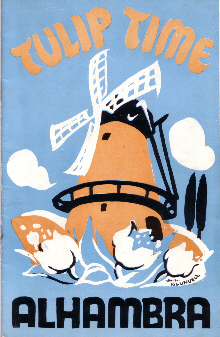 |
|
[Programme for Tulip Time at the Alhambra Theatre, London, 12th October, 1935.]
The Stage (18 July, 1935 - p.8) “Tulip Time.” ___
The Times (15 August, 1935 - p.8) THE ALHAMBRA. “TULIP TIME” An adaptation by WORTON DAVID and ALFRED PARKER of a play by ROBERT BUCHANAN and CHARLES MARLOWE. Music by COLIN WARK. |
|
|
|
The State of Vanderleue, in which the scene is laid, has, though itself imaginary, a certain variable affinity with Holland—a canal, for example, that enables those who are in maritime mood to enter by barge, an abundance of windmills chiefly poised on mountains that rise in abundant purple from the dykes, and, of course, tulips. Not natural tulips, alas, but female and choral tulips, lavishly limelit, and so fussy, so mixed, so messy in their imitation of that sculptural flower that the ballet in which they are engaged is more like an ice-cream vendor’s dream of a mixed drink than any bed of tulips within our fevered recollection. ___
The Observer (18 August, 1935 - p.11) The Week’s Theatres. Alhambra. “TULIP TIME.” An adaptation by Worton David and Alfred Parker of a play by The head-mistress of the academy for young ladies, in whose dormitories the heart of this hullaballoo raged, confessed that she hardly knew whether her establishment was a girls’ school or a night club. We shared her uncertainty. But when tulip time is delayed until August, anything may happen in such a school, from flying pigs to strange bedfellows. They happened here. H.H. ___
The Stage (22 August, 1935 - p.10) LONDON THEATRES. THE ALHAMBRA. “TULIP TIME.” On Wednesday evening, August 14, 1935, was produced here, for the first time in London, a comedy with music in two acts and eight scenes, re-adapted by Worton David and Alfred Parker from the play “The Strange Adventures of Miss Brown,” by Robert Buchanan and Charles Marlowe, with lyrics by Bruce Sievier, music by Colin Wark, additional music and lyrics by Hubert W. David, and dances and ensembles by Buddy Bradley, entitled:— “Tulip Time.” Angela Brightwell . . . . . . . . . . . . . . . . . . Jean Colin One’s first duty in dealing with this picturesque and tuneful comedy with music—which had an enthusiastic reception at the Alhambra—is to congratulate Anne Croft on the artistic success of her first stage production. The scene is laid in and about a girls’ school in the imaginary State of Vanderleue—which is not a thousand miles from Holland—and the result is a series of charming stage pictures of tulip fields, windmills, and old gardens delightfully restful to the view. Now and gain the performers and chorus descend into the auditorium by re-brick steps built up on one side, the other side of the well being occupied by the orchestra, who are in uniform. All of the scenery has been designed by Henry Burton, A.R.I.B.A. _____
The following page is taken from the Over The Footlights site. |
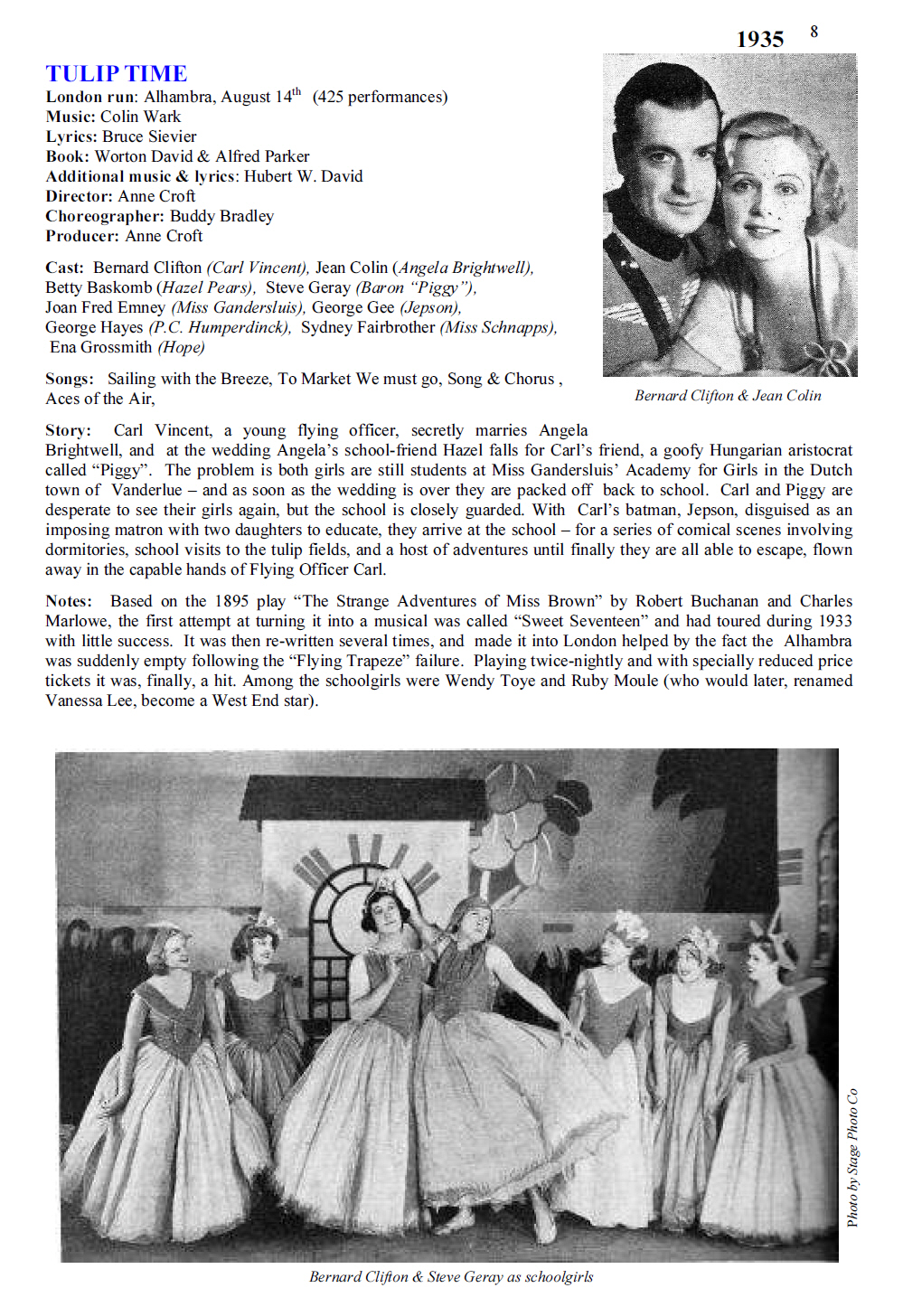 |
|
And the Keeping Score site has a list of recordings from Tulip Time: Aces Of The Air I Like You Noah Had Two Of Everything Sailing With The Breeze When You’re Only Seventeen (aka “Sweet Seventeen”) This is a medley on one side of a 78”, coupled with selections from Please Teacher. There’s actually a copy of this for sale at £9.99 on the discogs site, but, still having nightmares about the time I sat on my sister’s 78” copy of ‘Rip It Up’ by Bill Haley and the Comets when I was five, I daren’t risk it in the post, and a picture of the label will have to suffice: |
||||||
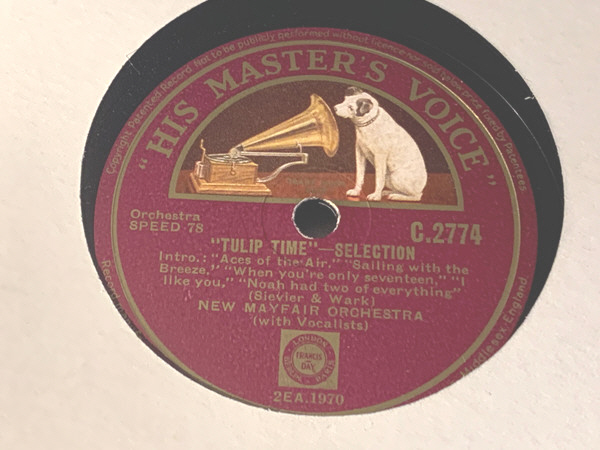 |
||||||
|
Programme for Tulip Time at the Alhambra Theatre, London, October 12, 1935. |
||||||
 |
||||||
 |
||||||
 |
 |
 |
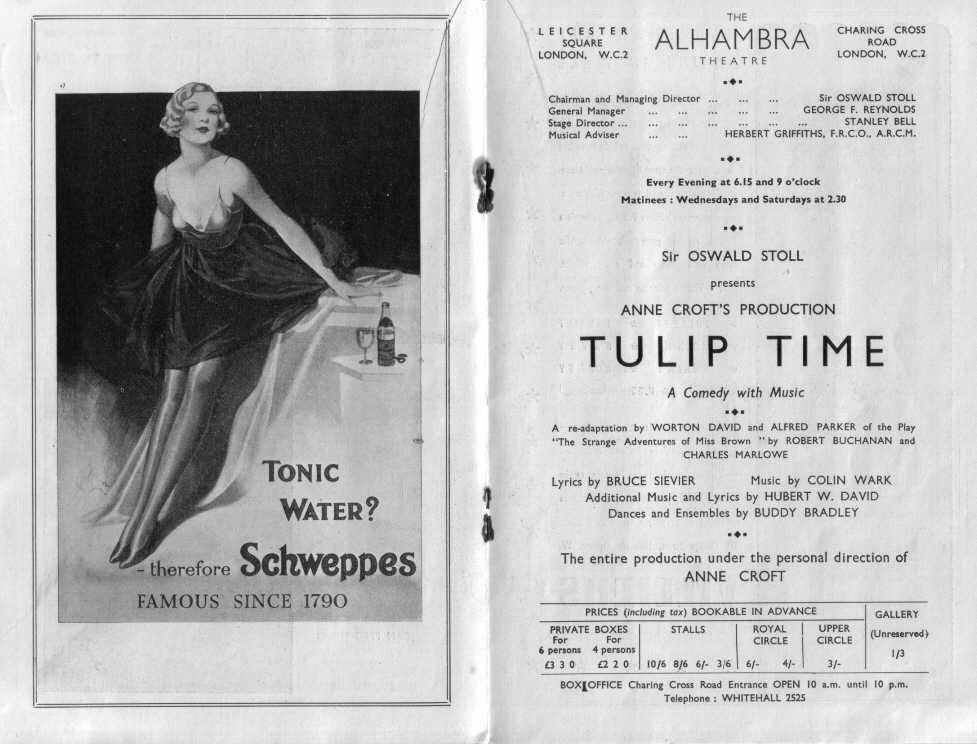 |
|||
 |
|||
 |
|||
 |
|||
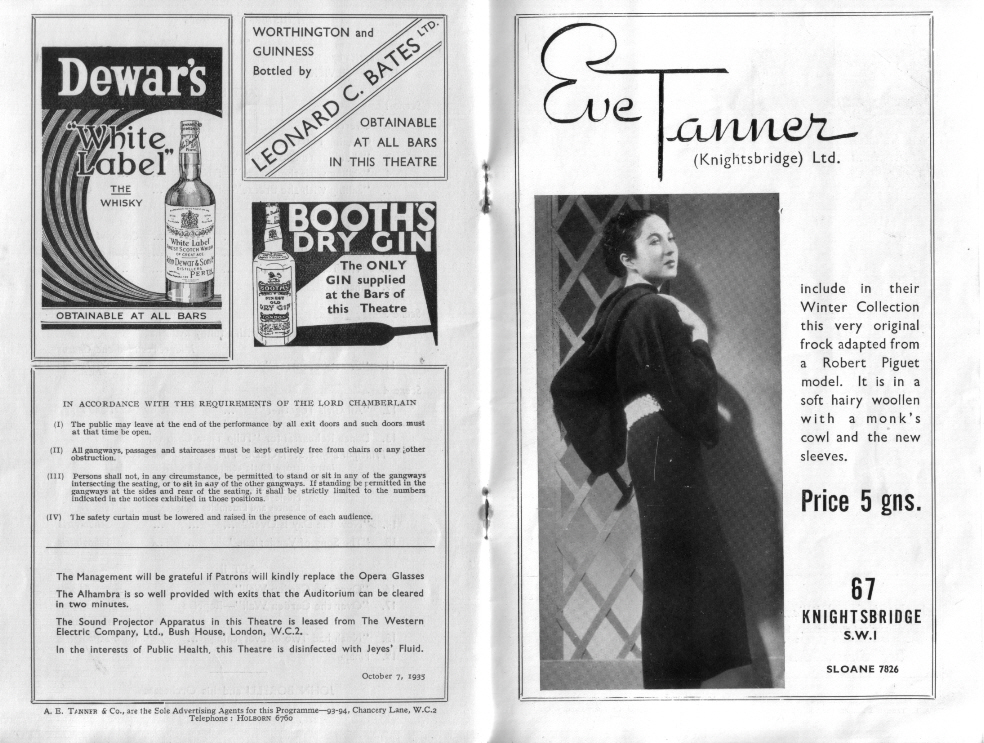 |
 |
||
|
On youtube you’ll find ‘Tulip Time musical comedy selections (Colin Wark) 1934’ for the ‘Steinway Model K 65/88 Note Pianola Player Piano Piano’ (!) And here are the Two Leslies performing ‘Noah Had Two Of Everything’:
|
||
|
Here are the covers of the sheet music for two of the songs from the show: |
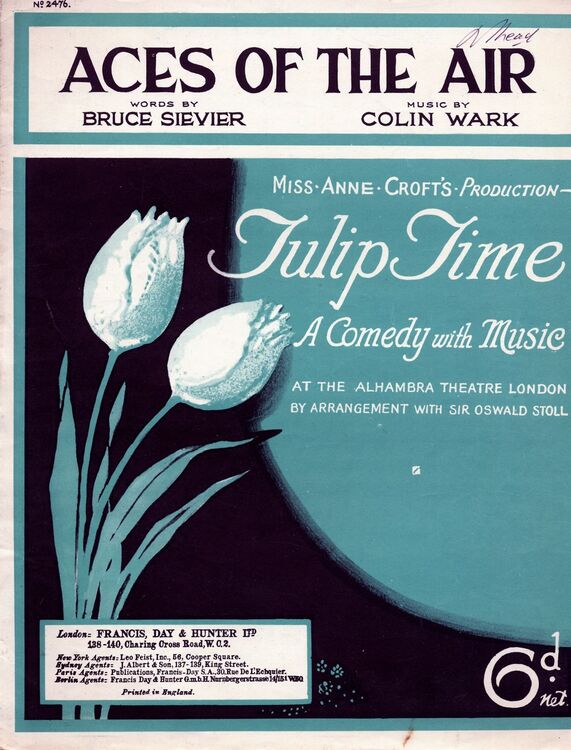 |
||
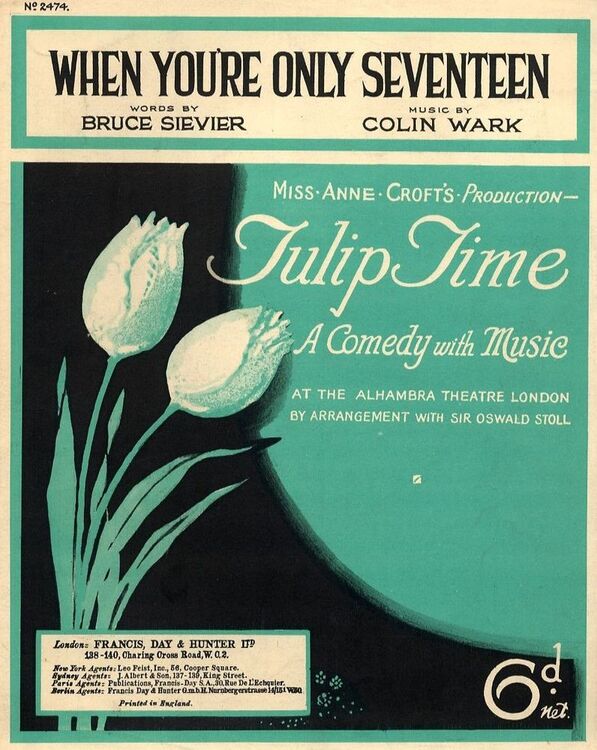 |
||
|
Finally, on the British Pathé site there is a 1935 clip of George Gee “the famous West End Comedian from ‘Tulip Time’” talking about shirts. _____
Back to The Strange Adventures of Miss Brown The Strange Adventures of Miss Brown - continued (ii) Bibliography or Buchanan’s Music
|
|
|
|
|
|
|